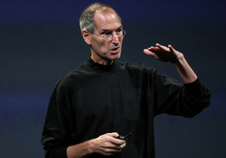
Georges Van Den Abbeele, dean of the College of Social Sciences and Humanities, remembers the late Steve Jobs, above, as a man always motivated to continue innovating.
On Wednesday, the world lost one of the greatest innovators of our time — Apple cofounder Steve Jobs. He was the driving force behind many of the company’s iconic products that have changed the way people work and interact, and how information is consumed. We asked Georges Van Den Abbeele, dean of Northeastern’s College of Social Sciences and Humanities, who was friends with Jobs when both were at Reed College, to describe what he remembers most about him — and what we can learn from his legacy.
When did you first meet Steve Jobs, and what do you remember about him from that time?
We were classmates at Reed College in 1972, and we were friends. He obviously had extraordinary talent that would get realized later, but seemed ordinary enough at the time. I remember several things about him. He was fascinated with eating Roman Meal bread, which he claimed helped the Romans conquer the world – and so would he. He built computers from scratch using spare transistors, processors and wires. That foreshadowed what was to come, though we didn’t think much of it at the time. He was also very taken with a class in calligraphy, which is very high-level letter design. That was important because when Apple launched its first computer, one of their major innovations was the ability to manipulate many fonts and point sizes. That was something he learned in this class, and had a lasting impression on the design of computers we have today.
When you think about his life and legacy, what stands out to you the most?
Throughout his career, and despite his iconic success, Steve was often underestimated. I remember him being relatively unassuming but very sharp and intellectually intense. The lesson for me as a professor in the University is that we don’t always know how people are going to turn out. People have various talents, and if they can discover how to put those talents to use in the right ways, they can go very far in life.
He had a constant perfectionist drive — never satisfied and always looking for something better and more innovative and interesting. He had that restlessness, and that’s something I take from him as a powerful life lesson.
What can we learn from Jobs and his vision?
It’s the willingness to be not just a visionary, but to act on that vision — to bring it into reality. A lot of people can be visionary, but Steve was one of the very few to realize his vision and continue building on it. Many people have been content to have one or two great ideas and then rest on their laurels. He just kept going and going. He had some notable failures, too, but those too kept driving him. The word “drive” is one you cannot help but associate with Steve Jobs. He was driven to get as much out of life and innovation as he possibly could.
For more information, please contact Greg St. Martin at 617-373-5463 or at [email protected].
Northeastern University’s College of Professional Studies (CPS) is committed to providing career-focused educational programs that are designed to accommodate the complex lives of motivated learners. Offered in a variety of innovative formats, CPS courses are taught by accomplished scholars and practitioners who have real-world experience. The result is an educational experience founded on proven scholarship, strengthened with practical application, and sustained by academic excellence.
Northeastern University is a global university with a tradition of partnership and engagement that creates an innovative, distinctive approach to education and research. Northeastern integrates classroom studies with experiential learning opportunities in 70 countries, and pursues use-inspired research with a focus on global challenges in health, security, and sustainability.